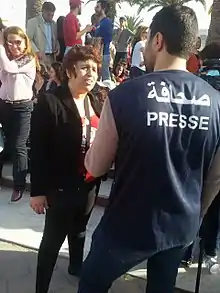Ahlem Belhadj
Ahlem Belhadj is a Tunisian psychiatrist and women's rights campaigner. Serving at various times as president, chair and director of the Tunisian Association of Democratic Women (ATFD), Belhadj campaigns for better treatment of women in Tunisia. She successfully fought for the right of women and children to apply for passports without permission of their husband/father. Belhadj led a march of thousands of women against President Zine El Abidine Ben Ali during the 2011 Tunisian Revolution. She is the 2012 winner of the Simone de Beauvoir Prize and placed 18th on Foreign Policy's 2012 list of global thinkers
Ahlem Belhadj | |
|---|---|
 | |
| Nationality | Tunisian |
| Occupation | Child psychiatrist |
| Known for | Women's rights campaigns |
Life
Belhadj grew up in Korba, one of five siblings. Her father was a teacher and mayor of the town for 20 years.[1] A keen athlete, she won many school prizes and competed for the Korba and Stade Nabeulien teams as well as the national team in the long jump and 100m.[2] Belhadj studied medicine at the Medicine School of Tunis where she became interested in politics. She took part in her first political march on 8 March 1983 (International Women's Day) and there met her future husband Brik Zoghlami, a lawyer who was in a Marxist revolutionary group.[1]
Belhadj was married in 1993 and has two children. Her husband was forced to work in France due to the regime issuing an arrest warrant against him, he later served 8 months in prison.[1] In 2004 Belhadj became president of the Tunisian Association of Democratic Women (ATFD).[1] Belhadj continues to practice medicine and specialises in child psychiatry.[3]
Belhadj was chair of the ATFD from 2011 to 2013 and campaigns for gender and social equality.[3][1] During the Jasmine Revolution of 2011 she led marches of thousands of women against President Zine El Abidine Ben Ali, the revolution later led to the fall of Ali and Tunisia's first ever democratic elections.[1] She campaigns for new laws to be put in place against domestic violence. In 2015 amendments that she campaigned for brought about the freedom for women and children to apply for their own passports, previously they had to have the permission of their husband/father.[3] She was director of the ATFD by 2014. Since the elections, which brought Islamist parties into power, Belhadj has been concerned by the resurgence of conservative Islamist policies. She has also complained of the disruption of ATFD meetings by government officials in the name of preserving "moral values".[1]
Described as the "Arab Spring’s Tunisian Heroine" she won the Simone de Beauvoir Prize and placed 18th on Foreign Policy's 2012 list of global thinkers.[3][1]
References
- Palet, Laura Secorun (20 February 2014). "The Arab Spring is for women, too". USA TODAY. Retrieved 4 November 2017.
- "Ahlem Belhadj Présidente de l'ATFD : L'équité des rapports hommes-femmes changera les rapports sociaux". Leaders (in French). 27 April 2012. Retrieved 4 November 2017.
- "Women's rights and struggles: Five years after Jasmine revolution". Socialist Resistance. 12 February 2016. Retrieved 4 November 2017.